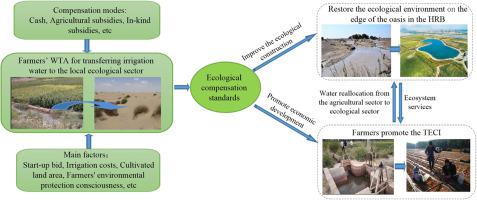Agricultural Water Management ( IF 5.9 ) Pub Date : 2021-02-19 , DOI: 10.1016/j.agwat.2021.106801 Guifang Li , Minjun Shi , Dingyang Zhou

|
Water reallocation from the agricultural sector to the ecological sector is an effective way to protect and improve the ecological environment and promote sustainable development in inland river basins. The concept of ecological compensation provides us with a key approach to coordinating economic development and ecological construction. However, most existing studies have paid insufficient attention to the ecological compensation mechanism for the cross-sector transfer of water resources. Taking the Heihe River Basin in northwestern China as a case, the object of this study is to evaluate farmers’ willingness to accept compensation (WTA) for transferring saved irrigation water to the local ecological sector on the basis of distinguishing regions and crops and to determine whether it is reasonable to take it as the ecological compensation standard. Based on the pre-investigation and double-bounded dichotomous contingent valuation model, the number of questionnaires is allocated according to the differences in the number of households in different villages, and face-to-face interviews are conducted by random sampling, The results show that the minimum farmers’ WTA for transferring seed maize, maize, and seed watermelon saved irrigation water to the local ecological sector are 0.53 RMB per m³, 0.24 RMB per m³ and 2.09 RMB per m³, respectively, and they are between the shadow price of agricultural water use in typical irrigation zones and the value of water resource ecological services This indicates not only that the evaluation of farmers' WTA can promote the coordinated development of economy–society–ecology but also that differentiated ecological compensation standards are needed on the edge of the oasis in the Heihe River Basin. If the compensation period is ten years, the total cost of this ecological compensation project is approximately 469 million RMB. In addition, the study also reveals that the start-up bid, irrigation cost, cultivated land area, proportion of agricultural labour and compensation policies variables have a positive impact on farmers’ WTA, whereas the proportion of agricultural income and the impact of land desertification and salinization, ecological wetland degradation and wind-sand weather on production and life variables have a negative effect. Furthermore, the findings indicate that cash, agricultural subsidies and in-kind subsidies are the most acceptable compensation modes.











































 京公网安备 11010802027423号
京公网安备 11010802027423号